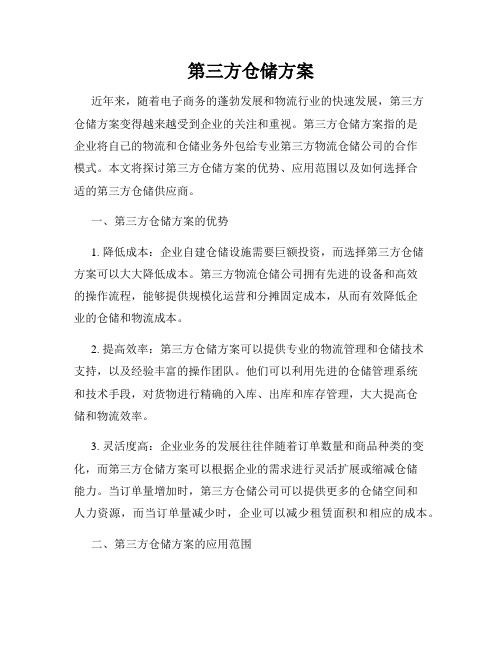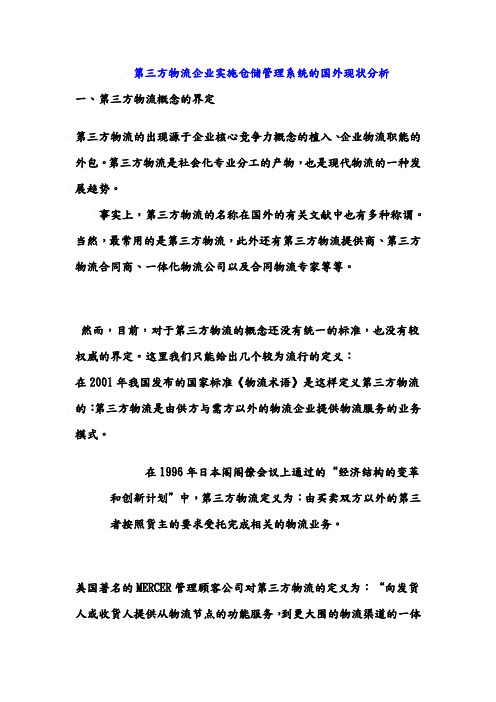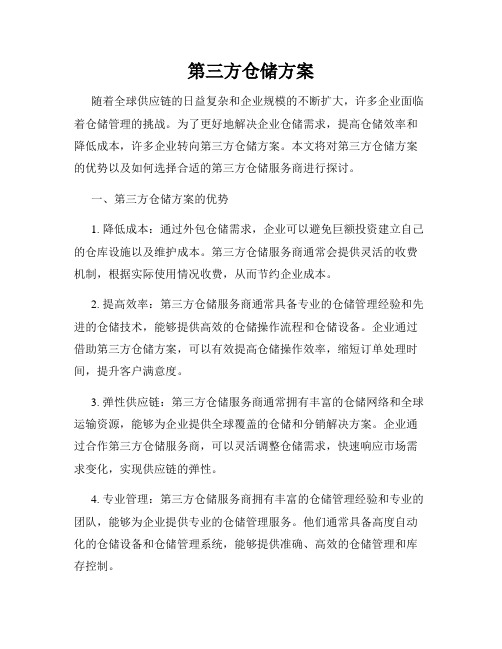“第三方仓储的选择:一个国家和地区性企业的比较”【外文翻译】
第三方物流仓库是指什么

第三方物流仓库是指什么
第三方仓库即合同仓库、云仓库,是指企业将仓库等物流活动转包给外部公司,由外部公司企业提供综合物流服务的仓库方式。
第三方物流仓库,顾名思义就是指第三方物流企业的仓库,是对物流过程中的仓储环节进行管理。
第三方物流仓库最早出现在美国,是因为货物在仓库中的存储和管理,对于货主来说需要耗费很多人工、时间和金钱成本。
而将所有货物集中于一个场所的存储管理模式逐渐发展起来,并应用于运输、仓储、装卸搬运、包装等服务功能。
目前在欧美发达国家,第三方仓库的管理模式已经从“仓储”向“一体化”发展;而国内许多企业也开始意识到第三方仓库管理模式的重要性。
所以从2009年开始第三方仓库管理项目在国内逐渐普及开来。
在这种时代背景下,第三方物流公司应运而生,目前已经发展到了第三方物流公司数量众多、业务范围广泛的时代。
那么第三方物流公司究竟是什么呢?。
第三方仓储方案

第三方仓储方案近年来,随着电子商务的蓬勃发展和物流行业的快速发展,第三方仓储方案变得越来越受到企业的关注和重视。
第三方仓储方案指的是企业将自己的物流和仓储业务外包给专业第三方物流仓储公司的合作模式。
本文将探讨第三方仓储方案的优势、应用范围以及如何选择合适的第三方仓储供应商。
一、第三方仓储方案的优势1. 降低成本:企业自建仓储设施需要巨额投资,而选择第三方仓储方案可以大大降低成本。
第三方物流仓储公司拥有先进的设备和高效的操作流程,能够提供规模化运营和分摊固定成本,从而有效降低企业的仓储和物流成本。
2. 提高效率:第三方仓储方案可以提供专业的物流管理和仓储技术支持,以及经验丰富的操作团队。
他们可以利用先进的仓储管理系统和技术手段,对货物进行精确的入库、出库和库存管理,大大提高仓储和物流效率。
3. 灵活度高:企业业务的发展往往伴随着订单数量和商品种类的变化,而第三方仓储方案可以根据企业的需求进行灵活扩展或缩减仓储能力。
当订单量增加时,第三方仓储公司可以提供更多的仓储空间和人力资源,而当订单量减少时,企业可以减少租赁面积和相应的成本。
二、第三方仓储方案的应用范围第三方仓储方案适用于各个行业和企业规模。
不论是大型跨国企业,还是小型中小型企业都可以受益于第三方仓储方案。
1. 电子商务行业:随着电子商务的快速发展,仓储和物流成为电商企业的重要环节。
选择第三方仓储方案可以帮助电商企业降低运营成本,提高订单处理效率,实现物流配送的及时性和准确性。
2. 制造业:制造业企业通常需要大量的仓储空间和物流运力来管理原材料、半成品和成品。
选择第三方仓储方案可以帮助制造业企业降低库存成本,提高仓储效率,并为企业提供定制化的物流解决方案。
3. 零售行业:零售企业需要面对快速变化的市场需求和季节性销售高峰期。
选择第三方仓储方案可以帮助零售企业灵活调整仓储能力,有效应对销售高峰期,提高商品周转率。
三、如何选择合适的第三方仓储供应商选择合适的第三方仓储供应商是确保第三方仓储方案成功实施的关键。
选择第三方仓储公司的技巧

松松云仓:https:选择第三方仓储公司的技巧第三方仓储公司是为管理部分或全部商品货物而构建的,这取决于您的业务需求。
在您开始储存运输产品时,你就可以与第三方仓储公司合作。
但是知道如何选择第三方仓储公司是第一步。
第三方物流公司他们没有提供实物产品。
你是根据他们的工作记录和他们的潜力来评估他们在仓储物流工作中提升你们公司的能力,并且是在衡量像一致性和效率这样的东西。
松松云仓:https: 这很难,但并不意味着没有办法准确地评估第三方仓储公司对你公司的可能价值。
要明白,你很可能要签订一份长期合同,所以在做出任何决定之前,花点时间做好所有必要的尽职调查。
在与任何一家公司达成协议之前,一定要与第三方物流团队接触几次;你可能没有机会与你正在考虑的第三方仓储公司合作,但看到他们的行动才是下一件最接近的事情。
有一件事也应该成为重点,那就是他们的规模能力。
如果您预期您的业务将在未来三到五年内增长,您将依附于这家公司,那么他们必须有一个能够与您一起成长的模式。
我们现在将不按具体顺序描述五个最重要的问题来作为选择第三方物流公司的技巧地理位置:一般情况下,你的第三方仓储合作伙伴应该在大约两天内地面运输你的目标。
这降低了您的运输成本,并增加了按时将您的产品交付给客户的机会。
信息技术能力:您的第三方仓储合作伙伴必须能够使用更新的技术,以提高您的业务。
实时跟踪、兼容系统和一个简单但有凝聚力的通信过程,允许跨所有平台访问,只是第三方仓储公司应该使用的一些技术工具。
直接对消费者和直接零售功能:这两者都是必不可少的,特别是对于可能无法管理单独库存系统的小企业而言。
使用具有这两种功能的第三方仓储公司,可以简化流程,降低开销。
灵活性:在物流领域,没有一刀切的办法。
做生意的本质已经变得过于动态,甚至需要个性化的方法才能有成功的机会。
你的第三方仓储公司必须能够灵活地松松云仓:https: 提供他们的服务,并愿意为你的公司做一些例外。
费用:这是一个必须考虑的因素。
如何选择第三方物流仓储公司

仓储作用主要表现再两个方面:一是完好地保证货物的使用价值和价值,二是为将货物配送给用户,在物流中心进行必要的加工活动而进行的保存。
第三方仓储物流公司的选择将会直接影响到卖家的成本以及买家的体验度。
我们可以从以下几点去关注:第一、完善的内部管理标准:商家在选择仓储服务的时候可以要求对方出示其内部管理文件,虽然目前的第三方仓储公司都已经通过ISO9001认证,但真正的文件之间仍存在一定的层级,商家可以要求对方提供各个层级的某一个文件查看,比如《作业指导书》等。
通过这些文件可以看出该第三方仓储公司的内部操作是否细致,内部做事标准是否合理。
第二、合理的报价避免隐性收费:目前电商的收费模式有两类,一类是按操作量进行收费(入库按件收费、发货按单及件收费、存储按件收费、退货按件收费);一类是按耗用资源,开发式合同收费(使用仓库、人员、设备、耗材进行收费)。
对于商家来说,通常会计算自己的物流成本,然后对比第三方仓储服务的报价,不同的报价之间会有差异,这里需要商家将费用核算清楚,注意避免一些隐性的收费。
第三、合理有效的项目运营计划:商家在找第三方之前,首先要明确好自身的需求,自身需要做的量,要达到的目标等。
根据商家的需求,优秀的第三方,如专注提供电商企业仓储外包的上海维佳供应链,就会在整个大的业务层面上给出一个未来的运营方案。
商家可以大致判断方案是否符合自身的需求,以及它的合理性。
第四、先进的项目实施流程:在方案的基础上,第三方会在采购、销售、财务管控等大的流程上,同时针对商家的特性给出具体的业务流程和设计。
对商家来说,要了解使用第三方后,跟现在的业务流程会有什么变化,第三方的库存管理逻辑是什么,怎样去跟原来的ERP系统对接,对财务来说在管理库存账目的时候怎么去核算等问题。
第五、高标准的仓储硬件配置:商家在选择仓储服务时,要注意第三方服务提供商在卫生及安全方面、库区消防条件(防鼠防蚊、防火防盗),等方面是否已达到丙二级,或国际上TAPA的标准要求;溯源监控设施(全封闭式管理,人货物理分离,门禁验证系统)是否24小时全天候监控。
第三方物流企业实施仓储管理系统的国内外现状分析

第三方物流企业实施仓储管理系统的国外现状分析一、第三方物流概念的界定第三方物流的出现源于企业核心竞争力概念的植入、企业物流职能的外包。
第三方物流是社会化专业分工的产物,也是现代物流的一种发展趋势。
事实上,第三方物流的名称在国外的有关文献中也有多种称谓。
当然,最常用的是第三方物流,此外还有第三方物流提供商、第三方物流合同商、一体化物流公司以及合同物流专家等等。
然而,目前,对于第三方物流的概念还没有统一的标准,也没有较权威的界定。
这里我们只能给出几个较为流行的定义:在2001年我国发布的国家标准《物流术语》是这样定义第三方物流的:第三方物流是由供方与需方以外的物流企业提供物流服务的业务模式。
在1996年日本阁阁僚会议上通过的“经济结构的变革和创新计划”中,第三方物流定义为:由买卖双方以外的第三者按照货主的要求受托完成相关的物流业务。
美国著名的MERCER管理顾客公司对第三方物流的定义为:“向发货人或收货人提供从物流节点的功能服务,到更大围的物流渠道的一体化服务;把运输管理、存货调度和信息技术结合起来,以较低的渠道总成本向客户提供增值服务。
”还有的学者认为,第三方物流是第三方物流提供者在特定的时间段按照特定的价格向使用者提供从系统设计、计划、管理到实施全面个性化的系列物流服务,这种物流服务是建立在现代电子信息技术基础上的,企业之间是联盟关系。
这些定义的表述方法、表述角度、表述容都不尽相同,但是几乎所有这些定义都表明这样一层意思:第三方物流是由买卖双方以外的第三方来承担物流职能的业务模式。
在此我们将提供第三方物流服务的企业称之为第三方物流企业,有时人们也将其直接简称为第三方物流(3 PL)。
二、仓储管理在第三物流企业中的重要性(一)仓储在第三方物流供需中占有重要地位其一,根据有关人士对第三方物流提供商的调查显示,目前,第三方物流企业提供的主要服务还停留在传统的运输和仓储两大块业务上,仓储在第三方物流提供的最常见服务中还占据着比较重要的地位(见表一1),81.1%被调查的第三方物流提供商中均提供此类服务。
第三方仓储方案

第三方仓储方案随着全球供应链的日益复杂和企业规模的不断扩大,许多企业面临着仓储管理的挑战。
为了更好地解决企业仓储需求,提高仓储效率和降低成本,许多企业转向第三方仓储方案。
本文将对第三方仓储方案的优势以及如何选择合适的第三方仓储服务商进行探讨。
一、第三方仓储方案的优势1. 降低成本:通过外包仓储需求,企业可以避免巨额投资建立自己的仓库设施以及维护成本。
第三方仓储服务商通常会提供灵活的收费机制,根据实际使用情况收费,从而节约企业成本。
2. 提高效率:第三方仓储服务商通常具备专业的仓储管理经验和先进的仓储技术,能够提供高效的仓储操作流程和仓储设备。
企业通过借助第三方仓储方案,可以有效提高仓储操作效率,缩短订单处理时间,提升客户满意度。
3. 弹性供应链:第三方仓储服务商通常拥有丰富的仓储网络和全球运输资源,能够为企业提供全球覆盖的仓储和分销解决方案。
企业通过合作第三方仓储服务商,可以灵活调整仓储需求,快速响应市场需求变化,实现供应链的弹性。
4. 专业管理:第三方仓储服务商拥有丰富的仓储管理经验和专业的团队,能够为企业提供专业的仓储管理服务。
他们通常具备高度自动化的仓储设备和仓储管理系统,能够提供准确、高效的仓储管理和库存控制。
二、选择合适的第三方仓储服务商的要点1. 综合评估:企业在选择第三方仓储服务商时,应该综合考虑其仓储设施、服务水平、技术能力和财务稳定性等方面。
可以通过查阅其官方网站、参考客户评价、实地考察等方式进行评估。
2. 与企业需求匹配:企业应该根据自身仓储需求,选择与之匹配的第三方仓储服务商。
例如,如果企业需要冷链仓储服务,则应选择具备该方面经验和设施的服务商。
3. 服务合同:在与第三方仓储服务商签订合同前,企业应仔细审查合同中的条款和条件,确保合同能够满足企业的需求,并避免可能出现的纠纷。
4. 数据安全性:企业在选择第三方仓储服务商时,应关注数据安全性。
第三方仓储服务商应具备先进的数据管理系统和数据安全措施,确保企业的数据得到保护。
仓储行业的跨境电商仓储模式与物流解析

仓储行业的跨境电商仓储模式与物流解析随着全球经济的不断发展,跨境电商行业成为了当今全球贸易市场中的重要组成部分。
在跨境电商中,仓储模式和物流运营发挥着重要的角色。
本文将对仓储行业中的跨境电商仓储模式和物流解析进行探讨。
一、跨境电商仓储模式跨境电商仓储模式是指通过建立仓储设施,将跨境电商商品进行集中存储和管理,以满足跨境电商企业的供应链需求。
在仓储模式中,存在多种形式的选择,下面将介绍几种常见的跨境电商仓储模式。
1. 境外自有仓库模式这种模式是指跨境电商企业在境外设立自有仓库,用于存储商品,并通过物流渠道将商品运输至目的国家或地区。
这种模式的优势在于企业可以直接控制仓库和物流运营,提高供应链的灵活性和效率。
2. 境外第三方仓储模式境外第三方仓储模式是指跨境电商企业将仓储和物流服务外包给第三方仓储物流服务提供商。
这种模式的优势在于企业可以借助第三方专业物流服务商的全球网络和经验,降低企业的运营成本。
3. 境内仓储配送模式境内仓储配送模式是指跨境电商企业在目的国家或地区建立仓储设施,将商品存储在境内仓库,并通过在当地建立的配送中心,实现最后一公里的配送服务。
这种模式可以降低仓储和物流的时间成本,提高商品的送达速度。
二、物流解析在跨境电商仓储模式中,物流运营是至关重要的一环。
物流解析涉及到货物的运输、仓储和配送等环节,下面将对跨境电商物流的解析进行说明。
1. 货物运输货物运输是跨境电商物流的重要环节,涉及到国际运输和国内配送两个方面。
国际运输主要通过海运、空运和陆运等方式进行,需要考虑运输时间、成本和货物安全等因素。
国内配送则是将货物从仓库运送到顾客手中,需要建立快速、高效的配送网络。
2. 仓储管理仓储管理是指对仓库内货物进行合理的存储和管理。
跨境电商仓库需要合理规划货物存放位置,采用科学的仓储设备和管理系统,确保货物的安全和高效管理。
3. 海关通关海关通关是跨境电商物流中一个必不可少的环节。
商品需要通过海关的检验和审核,确保符合相关的法规和规定。
简述自有仓库公用仓库第三方仓库的优缺点

简述自有仓库公用仓库第三方仓库的优缺点 Document serial number【UU89WT-UU98YT-UU8CB-UUUT-UUT108】物流学课堂作业简述自有仓库、公用仓库、第三方仓库的优缺点。
一自有仓库:优点:1更大程度的控制仓储2、自有仓储更具灵活性3、长期仓储时,自有仓储的成本低于公共仓储。
缺点:固定的容量和成本使企业的一部分资金长期被占用投资风险大。
自有仓库的优点1、较强的控制能力。
企业能够在自有仓库内,按照自己的意愿存储产品,从而对仓库具有较强的控制能力。
一旦顾客的需求或市场状况发生变化,企业就能够对仓库进行直接的控制和管理,使企业能够较容易地将仓库管理集成到企业的整个物流系统中去。
2、低成本优势。
从长期情况来看,自有仓库的运行成本相对较低,如果仓库能够得到有效地利用,仓库运行成本大约为物流成本的15%—25%,或者更低。
在实际操作过程中,企业对仓库的利用率为70%—80%。
一般认为,如果对自有仓库的利用率达不到75%,那么就应该考虑租赁公共仓库。
3、充分发挥人力资源的优势。
企业一旦拥有自有仓库,可以充分利用企业的人力资源,当企业自己的工作人员在管理仓库时,可以对仓库的存贮和维护更加细心,同时可以充分利用专业化带来的优势。
虽然一些公共仓库允许他们的客户在进行仓库管理时可以使用他们的雇员,但并不能从根本上解决上述问题。
4、税收和无形资产方面的优势。
拥有自有仓库,能够带来税收方面的优势,因为在建筑设施和技术设备方面的投入和折旧能够减少企业应该支付的税额。
同时,自有仓库可以给企业带来无形资产方面的优势。
当企业拥有自己的仓库时,能够给顾客一种持续、长久和稳定的商业运作印象,使人感到企业的产品供给是稳定的和可依赖的。
二公用仓库:这是一种专业从事仓储经营管理的,面向社会的,独立于其他企业的仓库优点 1、节省资金投入。
使用公共仓库的最大优点就是可以节省的投人,减小方面的压力。
企业可以免去投入在土地购买、仓库建设和仓库作业设备方面的,以及仓库初期的运行成本和雇用、培训仓库管理人员的开支。
- 1、下载文档前请自行甄别文档内容的完整性,平台不提供额外的编辑、内容补充、找答案等附加服务。
- 2、"仅部分预览"的文档,不可在线预览部分如存在完整性等问题,可反馈申请退款(可完整预览的文档不适用该条件!)。
- 3、如文档侵犯您的权益,请联系客服反馈,我们会尽快为您处理(人工客服工作时间:9:00-18:30)。
外文翻译原文“Third-Party Warehousing Selection:A Comparison of National and Regional Firms”Material Source:American Journal of Business Author:ChristopherR.MobergIntroductionThe recent explosion in the outsourcing of key logistics activities within supply chains is one of the most important trends in business today. The size of the logistics outsourcing market has increased from $25 billion in 1996 to an estimated $50 billion in 2000(Lieb and Randall 1996). With increasing pressure from shareholders to use assets more effciently, many firms are using third-party logistics providers (3pls) so that more attention can be given to core competencies that can be leveraged into long-term, sustainable sources of competitive advantage(e.g. Lewis and Talalayevsky 2000).According to a recent study, warehousing continues to be the most frequently outsourced logistics activity, with 63.3 percent of respondents from several industries reporting use of third-party providers for their warehousing needs(Langley 2001). Based on the increased use of third-party logistics providers overall and the large number of firms outsourcing the warehousing function specifically, one would expect that the logistics and supply chain literature would contain numerous research studies focusing on the third-party warehousing selection process. However, previous research has been largely limited to the broader topic of outsourcing and not on the factors affecting the outsourcing of specific logistics functions. It is quite possible that the importance of selection criteria may vary depending on which logistics activity is being outsourced. Therefore, more empirical research is needed that examines the selection process for specific functions so that logistics managers can improve the quality of their outsourcing decisions. Warehousing was examined in this research as a starting point because it is the most commonly outsourced logistics activity.Research FocusTo address this deficiency in the outsourcing literature, a survey was developed and distributed to current and potential third-party warehousing customers. This exploratory study had three main research questions. First, what are the general perceptions of logistics managers toward third-party providers and the outsourcing of the warehousing function? Next, when outsourcing is considered, what criteria are most important to warehousing customers when selecting thirdparty providers? Last, how effective are the typical national and regional third-party warehousing firms at meeting the needs of warehousing customers on each of the examined criteria?Third-Party WarehousingAs recently as five years ago, many experts were predicting the demise of the warehousing function. With the increasing capabilities stemming from new technologies and the emergence of collaborative supply chain strategies, there was speculation that the traditional warehousing function would get squeezed from the supply chain(e.g. Cooke 2000; Lear-Olimpi 1999). In spite of these predictions, today’s warehousing industry is s tronger than ever. While there has been a recent trend to consolidate warehousing networks, the amount of warehousing space has increased nationally. There are fewer warehouses, but they are bigger, more sophisticated, handle more customers, and offer more value-added services. Instead of declining, the warehousing industry has been presented with the challenge and opportunity of meeting the higher expectations of the typical warehouse customer.The renewed emphasis by manufacturers and retailers on core competencies has naturally increased the demand for third-party warehousing providers (e.g. Lewis and Talalayevsky 2000; Loudin 2000). A recent study in 1999 by the International Warehousing Logistics Association found that total public warehousing space was increasing by 12 to 13 percent and total contract space was increasing by 18 to 20 percent (Cooke 2000). In addition to basic storage and handling functions, customers now expect third-party firms to provide added services such as light assembly or labeling (e.g. Cooke 1998).In response to the increased outsourcing of logistics activities in the past decade, researchers have tried to develop frameworks and strategies for managers to use when deciding whether to outsource a function and to identify the critical factorsfirms consider when choosing among third-party providers (e.g. Maltz 1994a; Maltz 1994b; Lieb and Randall 1996; Sink and Langley 1997; Maltz and Ellram 1997; Razzaque and Sheng 1998). But, most of this research focused on the initial decision to outsource and not on the specific decision to outsource individual logistics functions such as warehousing or transportation. One study by the American Warehouse Association in 1994 found that the top ten selection criteria for firms choosing public warehouse providers was service quality, reliability, on-time performance, good communication, customer support, speed of service, flexibility, management quality, willingness to customize and order cycle time (Traffic Management 1995). Clearly, it is time to narrow the focus of outsourcing research to the decision making process for specific logistics functions.MethodologyBecause of the scarcity of research on the third-party warehousing selection process, in-depth phone interviews were conducted with twelve warehousing experts representing various supply chain roles. The group of experts consisted of four regional warehouse operators, four public warehousing customers, three warehousing management consultants, and one academic researcher with considerable expertise in warehousing. The logistics and warehousing experience of the interview subjects ranged from thirteen to forty-five years, and it should be noted that most of the experts had held positions as both warehousing customers and providers.ResultsRespondent ProfileThe managers that responded in this study had an average of 18.02 years of warehousing/logistics experience and represented the highest levels of management in their firms, with 16.8 percent holding the title of corporate officer, 34.8 percent in director positions, and 45.8 percent in manager positions. The typical firm represented by these managers was a large manufacturer in the grocery/food/beve- rage and consumer goods industries. The average annual global sales of firms in this research was 6.274 billion dollars, with 64.5 percent of the firms in the grocery/food/beverage industry and 22.6 percent in the consumer goods industry.Manufacturing firms accounted for 74.2 percent of the respondents, while 12.9 percent of the respondents were wholesalers and 11.6 percent were retailers.Logistics Managers’ Perceptions of Third Party Logistic Suppliers (3pls)The first goal of the study was to assess the general perceptions of logistics managers to the use of third-party warehousing providers. Means and frequencies for each question can be found in Table 1. There was some good news in the results for third-party providers based on the apparent willingness of managers to use 3pls. First, a majority of the respondents agreed that the performance of the ‘best’ 3pls is extremely high (mean = 3.74). In addition, respondents also tended to agree that they were uncomfortable with all of their outsourcing with one 3pls (mean = 3.35) and that a blend of private, regional, and national 3pls warehouses was best (mean = 3.11). These results indicate that many customers will include several 3pls in their warehousing networks and not just one national provider.Relative Importance of 3pls Selection CriteriaThe second goal of the study was to assess the importance of various selection criteria during the evaluation of third-party warehousing providers. In the survey, respondents were asked to rate the importance of each selection factor from 1 (not important at all) to 5 (extremely important) when they are evaluating third-party warehousing providers.Performance of National vs. Regional 3plsThe last goal of the research was to compare the performance of national and regional third-party warehousing providers based on the perceptions and experiences of their customers. The list of criteria used for the performance evaluation was not identical to the previous list, but did include nine of the twelve original items. Two items, size and national market coverage, were not included because they would not apply to the typical regional third-party provider.DiscussionFirst, perceptions of logistics managers of the thirdparty providers on the questions asked hovered around the scale mid-point and indicated no strongconsensus either way. This study is exploratory due to the scarcity of previous research on third-party warehousing and the results of all three research questions make a contribution to the logistics literature. However, some of the results are particularly interesting and merit further discussion. The results report good news for regional third party warehousing providers. Clearly, these findings can be used by regional third-party warehousing firms when competing with national firms for new customers. It should be noted that the generalizability of these findings is limited to relatively large manufacturing firms in the food and beverage and consumer packaged goods industries. The lack of attitudinal questions in this research limits the ability of the researcher to explain the “why” behind the logistics ma nagers’ ratings of selection criteria. Finally, this research only compared the performance of national and regional third-party providers. Future studies should examine the performance of smaller, local warehousing firms to assess their relative strengths and weaknesses while competing with other third-party firms.ConclusionThe importance to logistics practitioners of narrowing the focus of outsourcing selection research to specific logistics functions and of conducting empirical research cannot be overstated. As environmental and business factors continue to increase the pressure for logistics managers to outsource activities, it is the responsibility of researchers to empirically examine factors that may affect their decision. This research found that the top four selection criteria are responsive to service requirements, quality of management, track record of ethical importance, and ability to provide value-added services. It is hoped that this study will provide a key first step in the process of providing practitioners with information that can be used to make better decisions when selecting third party warehousing providers.译文“第三方仓储的选择:一个国家和地区性企业的比较”资料来源: 美国商业杂志作者:克里斯托弗莫贝格最近爆出物流外包会是当今企业在关键物流供应链活动中最重要的趋势之一。
